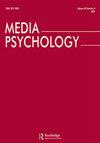Seeking Others’ Sounds: Predictors of Voluntary Exposure to Outgroup Music
IF 2.6
2区 心理学
Q1 COMMUNICATION
引用次数: 0
Abstract
ABSTRACT Intergroup contact research demonstrates that contact with outgroups (including mediated contact) improves attitudes about those groups. However, people often avoid such contact, including avoiding outgroup media messages. In two studies, we investigated voluntary exposure to outgroup media. Our research builds on intergroup contact theory and the reactive approach model. The latter suggests (counterintuitively) that, sometimes, anxiety can motivate people to engage with the unfamiliar. Both studies measured potential predictors of voluntary contact, provided musical options for respondents, and measured which options people chose as well as their engagement with and enjoyment of those choices. Study 1 provided a simple choice between two musical options (ingroup versus outgroup); Study 2 used a more extensive array of ingroup and outgroup options, including ingroup-outgroup collaborative music. Findings suggest a limited role of personality traits in determining seeking outgroup media, but a more powerful role for diversity-related attitudes and past exposure to outgroup media. Some evidence supported reactive approach models (e.g., self-expansion motives drove time spent listening to outgroup media in Study 1, but only for people who reported high levels of intergroup anxiety).寻找他人的声音:主动接触外群体音乐的预测因素
群体间接触研究表明,与外部群体的接触(包括中介接触)可以改善对这些群体的态度。然而,人们经常避免这种接触,包括避免群体外的媒体信息。在两项研究中,我们调查了自愿接触群体外媒体的情况。我们的研究建立在群体间接触理论和反应方法模型的基础上。后者(与直觉相反)表明,有时,焦虑会激励人们与陌生的人交往。这两项研究都测量了自愿接触的潜在预测因素,为受访者提供了音乐选择,并测量了人们选择了哪些选择,以及他们对这些选择的参与和享受。研究1提供了两种音乐选择之间的简单选择(组内和组外);研究2使用了一系列更广泛的组内和组外选择,包括组内-组外合作音乐。研究结果表明,性格特征在决定寻求群体外媒体方面的作用有限,但与多样性相关的态度和过去接触群体外媒体的情况更为重要。一些证据支持反应性方法模型(例如,在研究1中,自我扩张动机驱动了听群外媒体的时间,但仅适用于报告高水平群间焦虑的人)。
本文章由计算机程序翻译,如有差异,请以英文原文为准。
求助全文
约1分钟内获得全文
求助全文
来源期刊

Media Psychology
Multiple-
CiteScore
8.60
自引率
7.10%
发文量
30
期刊介绍:
Media Psychology is an interdisciplinary journal devoted to publishing theoretically-oriented empirical research that is at the intersection of psychology and media communication. These topics include media uses, processes, and effects. Such research is already well represented in mainstream journals in psychology and communication, but its publication is dispersed across many sources. Therefore, scholars working on common issues and problems in various disciplines often cannot fully utilize the contributions of kindred spirits in cognate disciplines.
 求助内容:
求助内容: 应助结果提醒方式:
应助结果提醒方式:


